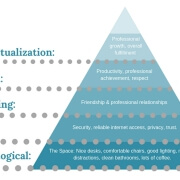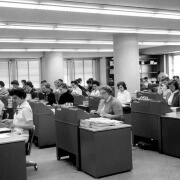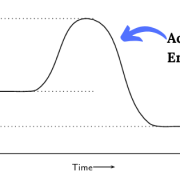Coworking through the lens of Facility Management
Coworking space management is maturing as the industry grows and expands. Although viewed by many as a disruption to the traditional commercial real estate industry, many of the same core principles that enable traditional corporate offices to run smoothly also apply to flexible workspace. Rather than ignore those principles, the coworking industry should go further to embrace and learn from the foundations of commercial real estate (CRE).
One of these foundational areas is Facility Management (FM).
What is Facility Management?
The best definition of Facility Management comes directly from the International Facility Management Association (IFMA), the world’s largest industry association for facility management professionals:
“Facility Management (FM) is a profession that encompasses multiple disciplines to ensure functionality, comfort, safety and efficiency of the built environment by integrating people, place, process and technology.”
IFMA.org
Facility Management professionals are directly responsible for an organization’s bottom line through direct maintenance of organizational assets such as property and equipment used in buildings within that portfolio. Through this work, FMs are protecting an organization’s most valuable asset, the productivity of its workforce.
While many FM Professionals do not have the same job title, particularly those working in large organizations, IFMA does have defined core competencies for the industry. These include:
- Operations and maintenance
- Occupancy and human factors
- Finance and business
- Sustainability
- Facility information & technology management
- Risk management
- Communication
- Performance and quality
- Leadership and strategy
- Real estate
- Project management
If you run a coworking business, this skill set should sound familiar. You are a Facility Management professional. To be successful in that role, these are the competencies you need.
What does each competency entail and how can it apply to coworking?
1. Operations and maintenance: FMs are most commonly known for being responsible for the management of the physical buildings & grounds. This entails overseeing building systems for proper function, safety, and reliability, but also includes furniture, fixtures, & equipment within the buildings.
Coworking space owners should have a working knowledge of all of the building systems from IT infrastructure to HVAC to plumbing, how to ensure they are all working properly, and how to schedule maintenance, upgrades, & installations as required. This must be done not only for efficiency of those systems, but also for the safety and security of the members working from the space.
2. Occupancy and human factors: FMs must consider how the physical environment of the workplace affects its occupants. This pertains especially to the health & well-being of occupants and how the built environment can impact them.
For example, Harvard University published research relating improved cognitive function to lower CO2 levels where cognitive scores were, on average, 61% higher in buildings with lower CO2 levels compared to conventional building conditions.
Don’t know where to start? The WELL Building Standard was established in 2014 by the International Well Building Institute in order to advance human health & wellness in the built environment and serves as a guide for how to positively impact occupant health through the human aspects of design including natural light, use of plants, high levels of air quality, ergonomics, and even healthy food choices.
3. Finance and business: These skills are as important for an FM as maintenance & operations. What used to mean spreadsheets of budgets and projections is quickly evolving to full scale business intelligence technology. This area also includes procurement with vendors for goods or services, contracting for projects, and all reporting of financial metrics related to the operations and management of the facility side of the organization.
4. Sustainability: Implementing strategies to reduce energy consumption or utilize renewable sources is just one part of how FMs must incorporate sustainability into building operations. The materials used for furnishings, fixtures that are water efficient, and waste management programs that encourage the minimization, collection, reduction, and disposal of waste in a sustainable manner are all choices within the purview of a Facility Management professional.
Starting with decisions to use sustainable products for cleaning, the kitchen, and bathrooms is a great start to begin making a coworking business more sustainable. If in a leased property, just replacing incandescent or fluorescent bulbs with LED lighting with the right color temperature can make a positive impact. Discouraging members from using single-use plastics by providing reusable cutlery and choosing sustainably sourced furniture are also a great place to start if implementing large scale renewable energy generation is out of range for your size business.
5. Facility information and technology management: Fulfilling a responsibility to maintain & operate buildings, their systems, and impact on the people using them all requires collecting and tracking data in order to properly assess how well everything is running. Just collecting the data isn’t sufficient. That data must be collected, verified, synthesized into relevant information, communicated out, and then used to make data-driven decisions that will positively impact operations. Smart building systems, sensor technology, & artificial intelligence are enabling buildings to react and interact with the humans using them, and helping to improve the workplace experience beyond responding to calls about too cold or too hot offices.
How often do you hear about your members being too hot or too cold? Are you tracking those comments and the temperatures in their offices or near their desks when you receive them?
6. Risk management: What happens to the operation of a business in the case of a natural disaster, or even a short term power outage? Evacuation plans, back up power sources like generators and UPS systems, and identifying other risks to business continuity are all central to the role of an FM. FMs are also responsible for increasing resilience by developing and implementing procedures that enable an organization to recover in the face of changing environment.
Coworking space owners can invest in backup power solutions, particularly if they are in regions with an unstable power grid, such as in more rural or mountainous regions. Developing and creating an evacuation plan for members that is updated and communicated out regularly is also vital. Additionally, a flexible office space may serve to help other workers or small businesses with their own resilience by providing a backup workplace in the case of nearby disasters or outages.
7. Communication: Effectively communicating to both stakeholders in the organization and to users of the built environment to keep them informed of important information is a key responsibility of any FM. This process includes developing a communications plan that includes collecting feedback, selecting the right audiences that need the information, choosing the best methods to deliver information and messages, and evaluating the effectiveness of the communication plan.
For coworking, this may be primarily focused upon the channels and methods used for communicating important information to members and others associated with your space. Do all of your members answer your emails or do you need a method for delivering important announcements more directly?
8. Performance and quality: Facility managers strive to continually make improvements to the performance of the organization’s facilities, operations, and systems. To do so, they must be able to both measure and analyze that performance in relation to the expectations set by the organization.
For coworking, this may mean measuring the costs of operation against membership revenue. If a growth goal has been set for revenue or expansion, how do facilities related aspects factor into achieving that goal?
9. Leadership and strategy: Especially in larger organizations, FMs must lead teams of staff and service providers in order to accomplish their facility goals for the organization. This leadership includes aligning with the broader goals of the organization’s mission.
Small & independent coworking business owners may have a limited staff, but still must interact with and manage vendors, maintenance professionals, landlords or building owners, as well as members.
10. Real estate: Understanding real estate principles is an important skill for FMs and it is expected for FMs to lend their expertise and knowledge of the facility to help guide decisions related to real estate as a physical asset to an organization. This spans understanding real estate portfolios as part of a long-term business strategy to the effective use of space within a specific building to optimize for workforce productivity.
Similarly, having an understanding of the basics of commercial real estate is important for coworking, regardless of the size or scale of the business.
11. Project management: Given the complex and wide range of responsibilities of a facility manager, project management skills are absolutely critical to every aspect of the profession.
Coworking space owners must also have a strong ability to plan, execute, and evaluate projects that can range from a few simple tasks for an event to complex and highly expensive construction build-outs.
As more and more commercial real estate is occupied for flexible workspace, the skills of the traditional facility management professional are becoming more and more critical to the success of coworking businesses. To strengthen the coworking industry, these must evolve together and incorporate best practices in order to ensure the productivity of the distributed workforce.











